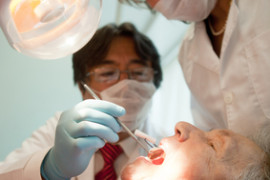Inflammation testing is one of the key steps to evaluating underlying systemic problems to help prevent and reduce the impact of inflammatory diseases. A team of researchers in Ireland has recently demonstrated that the presence of a particular oral pathogen increases levels of a common cardiovascular biomarker.
In the study, published in the Journal of Clinical Periodontology, over 500 60 to 70 year old men underwent a comprehensive periodontal exam. Researchers tested subgingival plaque to identify Aggregatibacter actinomycetemcomitans, Porphyromonas gingivalis, Treponema denticola and Tannerella forsythia. They also took fasting blood samples to measure C-reactive protein (CRP).
After adjusting for BMI, smoking status, and hypertension, P. gingivalis was associated with a 20% increase in CRP.
CRP, a measure of systemic inflammation, is used to assess a person’s risk for heart attack or stroke because risk for these conditions increases with elevated CRP levels. Elevated CRP tells us that there is infection somewhere in the body—with 80% of the adult population having some form of periodontal disease, there’s a good chance it’s in the mouth.
CRP levels can be up to seven times higher in patients with periodontal disease. It is imperative, therefore, that anyone with high CRP levels be evaluated and treated with advanced periodontal treatment, so the mouth does not become a risk factor for cardiovascular disease and diabetes.
It’s becoming increasingly clear that inflammation testing can play a key role in the path to reducing inflammatory diseases and the subsequent healthcare costs associated with them. Knowing that an elevated oral bioburden—with or without the presence of visual periodontal disease—can increase these biomarkers gives the medical and dental teams an unprecedented opportunity to collaborate their care and collectively reduce the effects of oral inflammation on overall health.
Source: The association between subgingival periodontal pathogens and systemic inflammation



